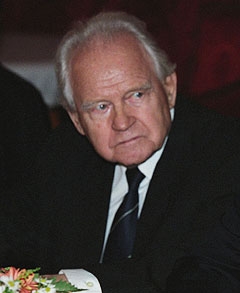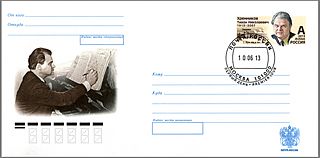Tikhon Khrennikov facts for kids
Tikhon Nikolayevich Khrennikov (Russian: Тихон Николаевич Хренников; 10 June 1913 – 14 August 2007) was a famous Russian and Soviet composer and pianist. He was also the General Secretary of the Union of Soviet Composers from 1948 to 1991. He was known for his music and his political activities.
Khrennikov wrote many different types of music. These included three symphonies, four piano concertos, and two concertos each for violin and cello. He also composed operas, ballets, and music for films and plays.
By the 1930s, Khrennikov was already seen as a very important Soviet composer. In 1948, Andrei Zhdanov, a powerful government figure, chose Khrennikov to lead the Union of Soviet Composers. He stayed in this important job until the Soviet Union ended in 1991.
Contents
About Tikhon Khrennikov
His Early Life and Music
Tikhon Khrennikov was the youngest of ten children. He was born in a town called Yelets in Russia. His family traded horses.
He learned to play the guitar and mandolin from his family. He also sang in a local choir and learned to play the piano. As a teenager, he moved to Moscow. From 1929 to 1932, he studied music at the Gnessin State Musical College. He then went to the Moscow Conservatory from 1932 to 1936. There, he studied composition and piano.
While he was a student, he wrote and performed his Piano Concerto No. 1. His first symphony, Symphony No. 1, was his graduation piece. It was even conducted by the famous Leopold Stokowski. Khrennikov became very popular for the songs he wrote for a play called Much Ado About Nothing in 1936.
In 1941, Khrennikov became even more famous with his "Song of Moscow." This song was from the popular Soviet film They Met in Moscow. For this, he won the State Stalin Prize. In 1941, he also became the Music Director for the Central Theatre of the Red Army, a job he kept for 25 years.
In 1947, he joined the Communist Party of the Soviet Union and became a representative in the government.
Leading the Composers' Union

In 1948, Joseph Stalin chose Khrennikov to be the General Secretary of the Union of Soviet Composers. This was a very powerful position, and he held it until 1991.
In this role, Khrennikov was involved in important discussions about music. At a meeting in 1948, he spoke about how music should be written. He even criticized some very famous composers like Dmitri Shostakovich and Sergei Prokofiev. Years later, he said he was forced to give that speech.
Khrennikov's role meant he had to follow the government's ideas about art. Sometimes, this meant criticizing styles of music that were considered "modern" or not fitting with Soviet ideals. For example, he criticized composer Alexander Lokshin for his "modernist" style.
During this time, there were also campaigns against certain types of music and artists. Khrennikov, as the head of the Composers' Union, was part of these campaigns. He was a member of the Central Committee of the Communist Party of the Soviet Union from the 1950s.
Later Life
Khrennikov's memories were published in a book in 1994. He passed away in Moscow at the age of 94. He is buried in his hometown of Yelets.
Khrennikov's Music
Symphonies
- Symphony No. 1 in B-flat minor, Op. 4 (1933–35)
- Symphony No. 2 in C minor, Op. 9 (1940–42)
- Symphony No. 3 in A major, Op. 22 (1973)
Concertos
- Piano Concerto No. 1 in F major, Op. 1 (1932–33)
- Violin Concerto No. 1 in D major, Op. 14 (1958–59)
- Cello Concerto No. 1 in C major, Op. 16 (1964)
- Piano Concerto No. 2 in C major, Op. 21 (1972)
- Violin Concerto No. 2 in C major, Op. 23 (1975)
- Piano Concerto No. 3 in C major, Op. 28 (1983–84)
- Cello Concerto No. 2, Op. 30 (1986)
- Piano Concerto No. 4, for piano, string orchestra and percussion, Op. 37 (1991)
Operas
- "Into the Storm", Op. 8 (1936–39)
- "Brother-in-Law Without Kindred", Op. 12 (1945–50)
- "Mother", Op. 13 (1952–57)
- "One Hundred Devils and Just One Girl", Op. 15 (1962–63)
- "The Boy Giant", children's opera, Op. 18 (1968–69)
- "Much Ado About Hearts" (1972–73)
- "Dorothea", Op. 27 (1982–83)
- "Golden Calf", Op. 29 (1984–85)
- "The Naked King", Op. 31 (1988)
Ballets
- "Our Courtyard" (Happy Childhood), Op. 19 (1970)
- "Love For Love", Op. 24 (1976)
- "A Hussar Ballad", Op. 25 (1978)
- "Napoleon Bonaparte", Op. 40 (1994)
- "The Captain's Daughter", Op. 41 (1999)
Music for Plays
- "Mik" (1934)
- "Much Ado About Nothing" (1935–36)
- "Don Quichotte" by Mikhail Bulgakov (1941)
- "A Long Time Ago" (1942)
Film Music
- "Swineheard and Shepherd" (1941)
- "Six O’Clock in the Evening After the War" (1944)
- "The Train Goes East" (1947)
- "Miners of Donetsk" (1950)
- "True Friends" (1953)
- "The Captain's Daughter" (1958)
- "Hussar Ballad" (1961)
- "Ruslan and Ludmila" (1972)
Awards and Recognition
Khrennikov received many awards and honors throughout his life.
Main Prizes
- Stalin Prizes: He won this prize three times (1942, 1946, 1952) for his film music.
- USSR State Prize (1967): For his concertos.
- Lenin Prize (1974): For his 2nd Piano Concerto.
- Prize of the President of the Russian Federation (2003).
Important Titles
- People's Artist of the USSR (1963): This is a very high honor for artists in the Soviet Union.
- Hero of Socialist Labour (1973): A top award for achievements in work.
Other Awards
He also received many medals and orders, including four Orders of Lenin, which were among the highest awards in the Soviet Union. He was recognized internationally as well, receiving awards from countries like Poland, Mongolia, Bulgaria, and France.
See also
 In Spanish: Tijon Jrénnikov para niños
In Spanish: Tijon Jrénnikov para niños
- Khrennikov's Seven
 | John T. Biggers |
 | Thomas Blackshear |
 | Mark Bradford |
 | Beverly Buchanan |


